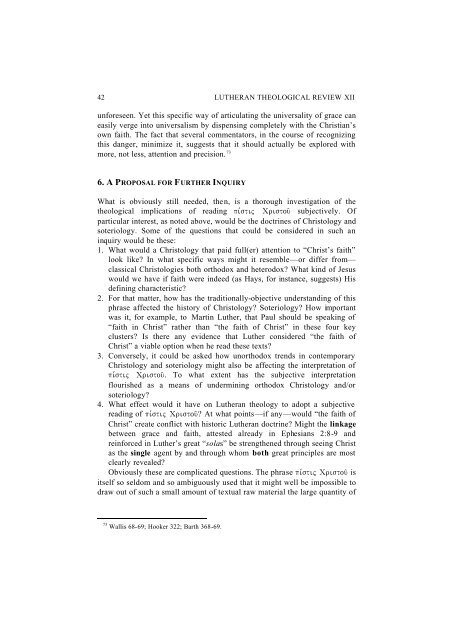LUTHERAN THEOLOGICAL REVIEW - Concordia Lutheran Seminary
LUTHERAN THEOLOGICAL REVIEW - Concordia Lutheran Seminary
LUTHERAN THEOLOGICAL REVIEW - Concordia Lutheran Seminary
Create successful ePaper yourself
Turn your PDF publications into a flip-book with our unique Google optimized e-Paper software.
42 <strong>LUTHERAN</strong> <strong>THEOLOGICAL</strong> <strong>REVIEW</strong> XII<br />
unforeseen. Yet this specific way of articulating the universality of grace can<br />
easily verge into universalism by dispensing completely with the Christian’s<br />
own faith. The fact that several commentators, in the course of recognizing<br />
this danger, minimize it, suggests that it should actually be explored with<br />
more, not less, attention and precision. 73<br />
6. A PROPOSAL FOR FURTHER INQUIRY<br />
What is obviously still needed, then, is a thorough investigation of the<br />
theological implications of reading pi,stij Cristou/ subjectively. Of<br />
particular interest, as noted above, would be the doctrines of Christology and<br />
soteriology. Some of the questions that could be considered in such an<br />
inquiry would be these:<br />
1. What would a Christology that paid full(er) attention to “Christ’s faith”<br />
look like? In what specific ways might it resemble—or differ from—<br />
classical Christologies both orthodox and heterodox? What kind of Jesus<br />
would we have if faith were indeed (as Hays, for instance, suggests) His<br />
defining characteristic?<br />
2. For that matter, how has the traditionally-objective understanding of this<br />
phrase affected the history of Christology? Soteriology? How important<br />
was it, for example, to Martin Luther, that Paul should be speaking of<br />
“faith in Christ” rather than “the faith of Christ” in these four key<br />
clusters? Is there any evidence that Luther considered “the faith of<br />
Christ” a viable option when he read these texts?<br />
3. Conversely, it could be asked how unorthodox trends in contemporary<br />
Christology and soteriology might also be affecting the interpretation of<br />
pi,stij Cristou/. To what extent has the subjective interpretation<br />
flourished as a means of undermining orthodox Christology and/or<br />
soteriology?<br />
4. What effect would it have on <strong>Lutheran</strong> theology to adopt a subjective<br />
reading of pi,stij Cristou/? At what points—if any—would “the faith of<br />
Christ” create conflict with historic <strong>Lutheran</strong> doctrine? Might the linkage<br />
between grace and faith, attested already in Ephesians 2:8-9 and<br />
reinforced in Luther’s great “solas” be strengthened through seeing Christ<br />
as the single agent by and through whom both great principles are most<br />
clearly revealed?<br />
Obviously these are complicated questions. The phrase pi,stij Cristou/ is<br />
itself so seldom and so ambiguously used that it might well be impossible to<br />
draw out of such a small amount of textual raw material the large quantity of<br />
73 Wallis 68-69; Hooker 322; Barth 368-69.













